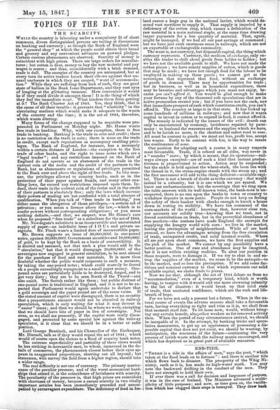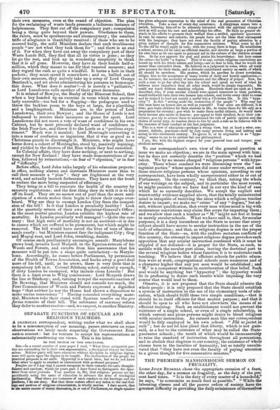EBB-TIDE.
"THERE is a tide in the affairs of men," says the poet, "which taken at the flood leads on to fortune" : and there is another tide which flows back to disaster. The prosperity of the Whig Mi- nistry, such as it is, has made its high-water mark. You may note the backward drifting in the conduct of the men. They have not strength to hold their own. If ever there was a call for decision and largeness of purpose., it was in the case of Ireland. The Ministers advanced a multi- plicity of little purposes; and now, as time goes on, the vacilla- tion which has clogged their steps is betrayed. They draw back
their own measures, even at the sound of objection. The plan for the reclaiming of waste lands presents a ludicrous instance of helplessness. They first cut off the compulsory part; compulsion being a thing quite beyond their powers. Obedience to them, the rulers, must be spontaneous and eleemosynary ; the smallest faitle of allegiance is thankfully received: if those who are to be coerced bully, the mild Ministers declare that such troublesome people "are not what they took them for "; and there is an end of it. For when they have cut away the compulsory part of their Waste Lands Bill, they find that all its virtue is gone ; so they let go the rest, and look up in wondering simplicity to think that it is all gone. However, they have in their hands half-a- million, which they meant to use for that vaunted measure; and they regard the cash as quite a windfall. It burns a hole in their pockets ; they must spend it somewhere ; and so, bullied out of their own measure, they naively take up a scrap of Lord George Bentinck's, and set about administering his panacea in homceopa- thic doses. What does it matter f—it is merely a "palliative," as Lord Lansdowne calls another of their great measures. It is related of Bowyer, the Busby of the Bluecoat School, that when a boy handed up an exercise in verse which was particu- larly execrable—too bad for a flogging—the pedagogue used to throw the luckless poem to the boys at large, for a plaything and a laughingstock. Ministers are, in the person of Lord Lansdowne, their own Bowyer ; and the House of Lords is not indisposed to receive their measures as game for sport. Lord Lansdowne did not move a vote of want of confidence in his own Cabinet, but he most piteously declared want of confidence in the Irish Poor-law, and threw it to the Lords as a "perilous expe- riment." Much was it mauled; Lord Monteagle converting it into a mass of confusion so ingenious that it was as good as a Christmas puzzle to disentangle it. Ministers, who might have borne down a cohort of Monteagles, stood by, passively repining, and yielded to the decrees of the Rice whom they had ennobled. In Colonial affairs, they have done nothing, or next to nothing, except for New Zealand : they have made demonstrations of ac- tion, followed by retractations,—in fear of "objection," or in fear of "difficulty."
Before office, Lord John talks largely of his education projects: in office2 nothing alarms and distresses Ministers more than to call their measure a " plan" : they are frightened at the very word, and actually beseech forbearance. They have not the heart to endure the mere being suspected of efficiency. They bring in a bill to renovate the health of the country by sanatory regulations; and the first thing they do with it is to lop off its head. They are no sooner out of port than the mere anti- cipation of a storm makes them begin to throw their cargo over- board. Why are they to exempt London City from the compul- sion of the bill ? Is it that London is peculiarly healthy ? Look at the quarterly return of their own Registrar-General's Office : in the most mortal quarter, London exhibits the highest rate of mortality-. Is London peculiarly well managed ?—Quite the con- trary: that high ratio of mortality is not an accident—it is due to causes which are suffered to be permanent, but which might be removed. The bill would have saved the lives of tens of thou- sands yearly : but Ministers cannot face the indignant City; Gog and Magog roar, and Lord John, trembling, desists.
Of course such pusillanimity encourages assault : Marylebone grows loud, invades Lord Morpeth in the Egerian retreats of his Woods and Forests, and extorts from him assurances that his measure will be put into a shape quite satisfactory—to Maryle- bone. Accordingly, he comes before Parliament, by permission of the Health of Towns Association, and hacks away a good deal more of his bill, until, as he avows, there is very little that is compulsory left in it. Colonel Sibthorp asked, naturally enough, if dirty London be exempted, why include clean Lincoln ? But there is a limit even to Whig concessions : Lord Morpeth draws the line at Sibthorp ; and, turning to repel the sarcastic caution of Dr. Bowring, that Ministers should not concede too much, the First Commissioner of Woods and Forests expressed a dignified hope "that neither he nor the House had shown a disposition to make undue concessions" I Having conceded everything mate- rial, Ministers take their stand with Spartan resolve on the pro firma remains of their bill. The substance of sanatory reform they defer to anothersession—and, we suspect, to another Ministry.



























 Previous page
Previous page